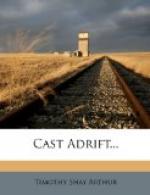“’They are too young and ignorant to know how to get themselves delivered from oppression; they do not speak our language, and find little or no sympathy among the people whom they annoy. They are thus left to the mercy of their masters, who treat them brutally, and apparently without fear of the law or any of its officers. They are crowded into small, ill-ventilated, uncarpeted rooms, eighteen or twenty in each, and pass the night on the floor, with only a blanket to protect them from the severity of the weather. In the mornings they are fed by their temporary guardian with maccaroni, served in the filthiest manner in a large open dish in the centre of the room, after which they are turned out into the streets to beg or steal until late at night.
“’More than all this, when the miserable little outcasts return to their cheerless quarters, they are required to deliver every cent which they have gathered during the day; and if the same be deemed insufficient, the children are carefully searched and soundly beaten.
“’The children are put through a kind of training in the arts of producing discords on their instruments, and of begging, in the whole of which the cruelty of the masters and the stolid submission of the pupils are the predominant features. The worst part of all is that the children become utterly unfitted for any occupation except vagrancy and theft.’
“You have the answer to your question, ’Where do all these little wretches come from?’” said the missionary as he laid aside the paper from which he had been reading. “Poor little slaves!”
CHAPTER XXII.
EDITH’S life, as we have seen, became lost, so to speak, in charities. Her work lay chiefly with children, She was active in mission-schools and in two or three homes for friendless little ones, and did much to extend their sphere of usefulness. Her garments were plain and sombre, her fair young face almost colorless, and her aspect so nun-like as often to occasion remark.
Her patience and tender ways with poor little children, especially with the youngest, were noticed by all who were associated with her. Sometimes she would show unusual interest in a child just brought to one of the homes, particularly if it were a boy, and only two or three years old. She would hover about it and ask it questions, and betray an eager concern that caused a moment’s surprise to those who noticed her. Often, at such times, the pale face would grow warm with the flush of blood sent out by her quicker heartbeats, and her eyes would have a depth of expression and a brightness that made her beauty seem the reflection of some divine beatitude. Now and then it was observed that her manner with these little waifs and cast-adrifts that were gathered in from the street had in it an expression of pain, that her eyes looked at them sadly, sometimes tearfully. Often she came with light feet and a manner almost cheery, to go away with eyes cast down and lips set and curved and steps that were slow and heavy.




